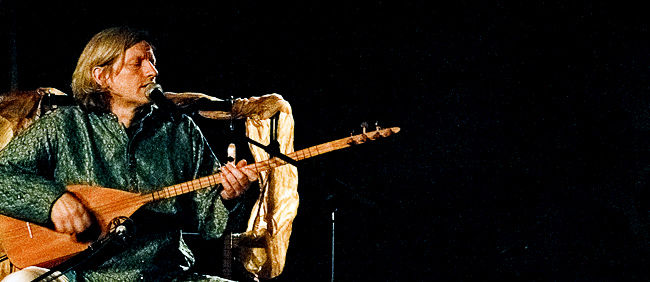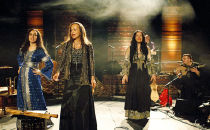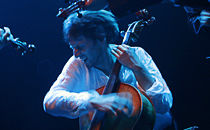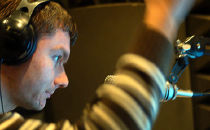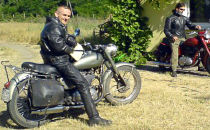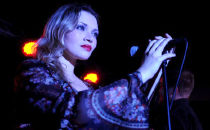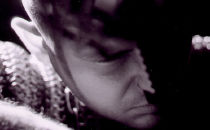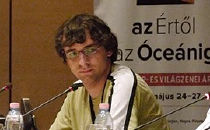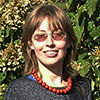How did Al Andaluz Project come into existence?
I have been a musician for quite some time, I have been played in many known medieval bands, e.g. Estampie. I am also "famous" for being very critical towards music. After one concert a fan came to me and said: "I know that you are so crtitical, but here is something that you would surely like". It was L’am de Foc’s CD. I really liked it, left it in my car but then it was gone. After a while my wife found it by chance, so I finally got it back. Luckily, Aman Aman, which is a side-project of L’Ham de Foc, was playing in Munich two weeks later. I went to their concert and asked if they were interested in participating in a three cultural project of Al Andaluz. They agreed and shortly, after one week or so, we had the first material. They visited me in Munich, I met them in Spain – everything went easily, has always been and still is. This is how it started.
Have you ever been in touch with the oriental music before the Al Andaluz Project started?
In the Al Andaluz Project we deal with medieval music, it is a world music project, which is based on three cultures: Christian, Muslim and Sephardic. This music comes from XIV or XV century and that is why I am actually involved in that - I am an extra specialist on medieval music. I have been played it with Estampie since 1985. When you deal with medieval music, the oriental one is very close. Because almost everything that we have here, in Europe, is music coming from the Arabs. Arabic music is influenced by Indian music, and it goes hand by hand, one step follows the other, so it is very easy to get into this field when you understand what medieval music is about. Above that it is very interesting that in those times it was an international society, there were no borders, it was a mixture of cultures, customs, music and knowledge. This is what is happening again now. For example, I have another project called Marco Polo, which is connected with the theme of Silk Road. It wasn’t possible to do it twenty years ago because the musicans from Tadzykistan with whom I had worked with couldn’t travel across the iron curtain then, they couldn’t even practice their traditional music.... The fall of the Berlin wall was like opening a new hemisphere. All of a sudden such multicultural projects could come to existence.
Who is your project adressed to?
To everyone who like it, heh! The question makes sense, cause sometimes we play in medieval scenery: churches, castles; sometimes at culture festivals, very often open airs at culture festivals. In Spain the things are very much mixed – there is no world music in the way we see it. They have so many different styles in their country... They have already world music at home, heh. They have a lot of festivals, but they call it folk music, actually. We play there and there are many different people interested in our performances.
What about playing in other countries for a non-Spanish audience?
The language in which we sing is not really Spanish. It is a project of three cultures, one language is classical Arab, even if the music came from the Western part, but the form of the music which we deal with had origins in Syria. We have also ladino - the language of Sephardic Jews, we have Galician, which appears in early Cantigas de Santa Maria, but this is not modern-day Spanish, it is more like ancient Spanish.
Is the traditional music popular in Spain? Is the concept of three cultures in Spain still actual?
It is very popular, the expression "tres culturas" – Muslim, Jewish and Christian, is a very popular theme in Spain, lots of groups are releasing CDs on this subject...
Are these bands popular?
Some of them yes. It is very different - it is like with the medieval scene, some of them are famous only among the certain scene. But these bands are not completely unknown. When we came up with idea that we want to do a three cultures project, we had a discussion. The remarks were: "Oh, I would like to do something, but we have to do something else, because a lot of people did something of this kind". And I told them: "First of all, we don’t know if this scene is known in Germany and in other countries in Western Europe. Let’s check!" Secondly, we make it in a different way. We have much more folk music influence. It is not historically, traditionally correct, it is our interpretation, we interpret it with three singers: Mara Aranda, Sigi Hausen and Iman al Kandoussi and this is what we actually do.
In the Al Andaluz Project you play very interesting old instruments. Tell me about them, are they reconstructed?
Some of them are traditional, like saz, tar, which still exist (they are still being used), some of them are reconstructed and some are not any more, some are discovered.. There are still people playing them and we usually buy instruments from them. This is an extremely important issue for us, because we are very careful in choosing the sounds. What is also so important is that two of these cultures are still existing. Only the Christian music from medieval times has died out and is reconstructed. "Music of Al Andaluz", how they call it, is still alive, still played, often with a great success! People with whom we work, for example, Aziz Samsaoui, a quanun player, is an expert on it. He learned it from the people he knew before in the village, people who learned it from their ancestors, this knowledge is still passed on from one generation to another, throughout the centuries. Then Aziz continued his study in the Conservatory of Andalusian Music in Tetuan. Sephardic tradition didn’t die. We have extremely interesting recordings of very old people singing sephardic songs. They have survived in a small amount and only in special places.
Do you visit villages and learn from the old people how to play, how to sing in a traditional manner?
Sure, that is what we do.
Do you feel more like a folk music or a world music group? How would you describe your music?
Our music sounds like a real crossover. It has parts of rock music and traditional music, also early classical music. We want to mix, cause we believe in that the music of that time varied, was a mixture not only of different cultures but also of different styles as well. All the terms that you used make me think... What is "world music" exactly? Most of the people probably would answer: "Pop music with some extra European influence".
Let me explain: by world music I meant bands playing traditional music but in a new way, like the ones performing at this festival. For example yesterday’s Chalaban from Marocco: playing very tradtional instruments, but sometimes they used also percussion.
A mixture of traditional music with modern influences - this is also what we do. It depends on the amount, on the quantity of the ingredients. It is like a soup, you take this and that, it just tastes differently. Some bands take more traditional elements, some take more pop music elements. But we are a mixture of everything, I could not say exactly if it is a world music..., it is probably not real world music. But, if I had to choose one term to define I would say : it is a folk music.
What was the reaction after relasing your debut CD "Deus Et Diabolus"?
I would say it was good, even extremely good. It was released in Germany and Spain in 2007. In both countries it went quite well, I think that we have had about ten thousand copies already sold, which is for this kind of project not bad. And it is still going on, still on the way... I remember, we made a radio station tour in Spain and I was surpised, cause I knew that in Western Europe they would like it, I know the scene very well, they already liked L’Ham de Foc and Estampie. I was not sure about Spain, but they liked it, and it was very well accepted.
The Al Andaluz Project was one of the stars performing at Warsaw Cross Culture Festival in 2009, having a standing ovation from the audience. What were your impressions after the show?
The concert in Warsaw remained in our memory as a very, very special event. The audience as well as the friendly organizers, the journalists, everybody was open-minded and communicative. I honestly can say that we had a really good time. Plus I had some interesting talks about the development of world music in general and some negative impacts through pop music influence on it.
How do you recall collaboration with Polish group Mosaic on the stage during this Festival ?
I liked this kind of collaboration very much. When you take into consideration, that we had only a couple of hours to practice together plus language problems (our Spanish and Maroccan collegues speak very little English) I think, we managed to collaborate quite well. We planned even to invite them to Germany to play together a couple of concerts, but it is hard to organize. Maybe one day it will happen.
We are keeping our fingers crossed! In 2010 you released the second album "Al-Maraya". What kind of the material it is ?
Basically, we continued to travel the same music road. Is it the same concept of peaceful collaboration between Muslim, Jewish and Christian people. There is still so much material we can work on, that we delayed our innovative plans onto further releases. The first CD was recorded in Spain, the second in Germany, the third one will be recorded in Marocco next year.
What was the line-up for "Al – Maraya"? On the website I saw, in comparison with the previous CD, some "new" instruments, like tabla, harp etc.
Since we recorded in Germany, I could use all my connections with the musicians I know and worked with in the past. When you think that nearly hundred musicians worked with Estampie in the past, you can imagine there was a great choice of friends who wanted to contribute something to the Al Andaluz Project. In this sense the second album "Al Maraya" was a little bit more influenced by Estampie than the first one, "Deus et Diabolus".
In February 2012 "Abuab Al– Andalus", the newest CD/DVD was released. First, what does it mean the word "Abuab" which appears in the title? And what is so interesting about this new album?
"Abuab" is the plural of the word "bab" which means "gate". Well, we found it interesting to present our show on DVD. We put a lot of energy in finding suitable decoration, we added also some unreleased tracks and some new live arrangements of already released studio versions.
What are your upcoming plans? What are your plans for the nearest future - are you working on the new material?
We have just come back from a quite successful spring tour through Germany. After 5 years of the Al Andaluz Project we still love to work together and we have a lot of future plans. At the end of this summer we have the first meetings devoted to choosing and rehearsing the new material. We plan to record it with some Maroccan friends and guests, so maybe it will sound a bit more oriental. In March 2013 or so we plan to have everything done and recorded, inch'allah.
You are a very experienced musican, involved in many interesting projects. In which groups do we have the chance to see you on stage at present?
At the moment I am involved in four projects: Al Andaluz, Estampie, Qantal and Vocame. As I mentioned before, the Al Andaluz have just come back from the German tour and will play next at the big folk festival in Rudolstadt. We also plan the new album that should come next year. Estampie has just finished the new recording with Scandinavian music - the new CD will come out this year. Qntal will play at the Wave Gothic Festival in Lipsk two times and is thinking at the moment about the new release. Our real classical ensamble Vocame is working now on the new album with Music of Hildegard von Bingen and has a couple of concerts this year.
We live in an Internet era. Where can we find information about the Al Andaluz Project in the web?
Our website is http://www.alandaluzproject.de/index.php – it is in German, at the moment we are working on English and Spanish versions. We have also myspace http://www.myspace.com/alandaluzproject and official profile on facebook: https://www.facebook.com/alandaluzproject.
What do you think about touring in Poland in the future?
We would love to come to Poland again! If anybody can help us to organize this and make it happen..... they are welcome:)
Thank you very much for your time and answers!
